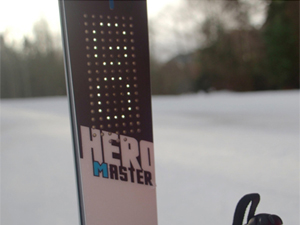



Date:08/02/17
 At the ISPO sports trade show in Munich this week, two French companies announced they were joining forces to create the first “connected ski.” The device is the result of a collaboration between outdoor apparel and ski manufacturer Rossignol and tech startup PIQ Sport Intelligence, a company that focuses on creating wearables that track motion and provides real-time feedback on performance. Both bring their considerable expertise to the project, creating a new ski that has the potential to revolutionize our time on the slopes.
At the ISPO sports trade show in Munich this week, two French companies announced they were joining forces to create the first “connected ski.” The device is the result of a collaboration between outdoor apparel and ski manufacturer Rossignol and tech startup PIQ Sport Intelligence, a company that focuses on creating wearables that track motion and provides real-time feedback on performance. Both bring their considerable expertise to the project, creating a new ski that has the potential to revolutionize our time on the slopes.
When building this high-tech device, Rossignol started with its popular and iconic Hero Master and integrated PIQ’s Robot nano-computer directly into the ski itself. That computer is programmed with the Group of Artificial Intelligence Applications (GAIA) system, which was specifically designed to analyze movement in sports and provide constantly updating feedback on performance. When it comes to skiing specifically, the AI can track speed, the angle of turns, G-forces felt, and much more, giving skiers a wealth of data that has never been available to them before.
We have seen smart devices designed to track skiers before but what sets this one apart is that the skis actually come with a built-in LED screen. Located just in front of the ski binding, that display is capable of providing information to the skier in real time, even as they bomb down the mountain. That puts GAIA’s data front and center, allowing the user to see at a glance just how well they are performing. In the past, skiers would typically have to wait until after they had finished their run to get a look at those variables.
At the moment, the new connected ski is only a prototype, but Rossignol and PIQ have plans to move ahead with this project and eventually bring it to market. It’s unclear exactly when we can expect to be able to purchase a set, though.
PIQ puts AI to work in the 'world's first' smart ski
 At the ISPO sports trade show in Munich this week, two French companies announced they were joining forces to create the first “connected ski.” The device is the result of a collaboration between outdoor apparel and ski manufacturer Rossignol and tech startup PIQ Sport Intelligence, a company that focuses on creating wearables that track motion and provides real-time feedback on performance. Both bring their considerable expertise to the project, creating a new ski that has the potential to revolutionize our time on the slopes.
At the ISPO sports trade show in Munich this week, two French companies announced they were joining forces to create the first “connected ski.” The device is the result of a collaboration between outdoor apparel and ski manufacturer Rossignol and tech startup PIQ Sport Intelligence, a company that focuses on creating wearables that track motion and provides real-time feedback on performance. Both bring their considerable expertise to the project, creating a new ski that has the potential to revolutionize our time on the slopes.When building this high-tech device, Rossignol started with its popular and iconic Hero Master and integrated PIQ’s Robot nano-computer directly into the ski itself. That computer is programmed with the Group of Artificial Intelligence Applications (GAIA) system, which was specifically designed to analyze movement in sports and provide constantly updating feedback on performance. When it comes to skiing specifically, the AI can track speed, the angle of turns, G-forces felt, and much more, giving skiers a wealth of data that has never been available to them before.
We have seen smart devices designed to track skiers before but what sets this one apart is that the skis actually come with a built-in LED screen. Located just in front of the ski binding, that display is capable of providing information to the skier in real time, even as they bomb down the mountain. That puts GAIA’s data front and center, allowing the user to see at a glance just how well they are performing. In the past, skiers would typically have to wait until after they had finished their run to get a look at those variables.
At the moment, the new connected ski is only a prototype, but Rossignol and PIQ have plans to move ahead with this project and eventually bring it to market. It’s unclear exactly when we can expect to be able to purchase a set, though.
Views: 439
©ictnews.az. All rights reserved.Similar news
- Justin Timberlake takes stake in Facebook rival MySpace
- Wills and Kate to promote UK tech sector at Hollywood debate
- 35% of American Adults Own a Smartphone
- How does Azerbaijan use plastic cards?
- Imperial College London given £5.9m grant to research smart cities
- Search and Email Still the Most Popular Online Activities
- Nokia to ship Windows Phone in time for holiday sales
- Internet 'may be changing brains'
- Would-be iPhone buyers still face weeks-long waits
- Under pressure, China company scraps Steve Jobs doll
- Jobs was told anti-poaching idea "likely illegal"
- Angelic "Steve Jobs" loves Android in Taiwan TV ad
- Kinect for Windows gesture sensor launched by Microsoft
- Kindle-wielding Amazon dips toes into physical world
- Video game sales fall ahead of PlayStation Vita launch





















